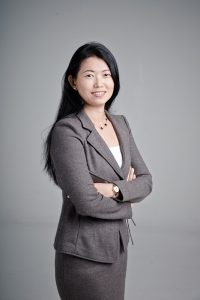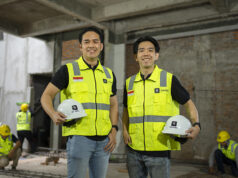
This article on AngelCentral appeared in the Norway-Asia Business Review. Click here to read the magazine.
Women remain underrepresented as both startup founders and angel investors. While there are more female founders now than three or four years ago, encouraging more women to become investors might trigger a larger shift.
Angel investors play an important role in the startup cycle. In many cases, they fill the gap between seed funding and the raising of venture capital. The support of angels makes it easier for startups to survive during a critical time in their existence.
Huang Shao-Ning, Partner at AngelCentral, has experience as both a founder and an angel investor. In 2000, she teamed up with her then friend and future husband, Lim Der Shing, to start JobsCentral. It would go on to become one of Singapore’s largest job portals before CareerBuilder purchased it in 2011. She stayed with the company until 2014.
These days she is working with her husband and retired corporate giant Phey Teck Moh to help Singapore’s startup scene with AngelCentral. The organisation’s goal is to create an informed, active angel community for Southeast Asia by hosting educational activities, curated deal flows, funding syndications and more.
Singapore placed eighth on the 2017 Women Entrepreneur Cities Index which ranks global cities based on their support for high-potential women entrepreneurs. Shao-Ning notes that while she has seen an uptick in female founders, this is only part of the startup equation.
“Personally, I am on a quest at AngelCentral to find more women angel investors. When we have more women angels, we increase the chance women-led startups have of being able to meet with and be vetted by potential investors,” Shao-Ning says. “Also, at the negotiation table, having a woman on the other side does make the air less stifling and daunting.”
Of Shao-Ning’s 18 angel investments, women founders lead six of them and five boast women CEOs. A pair of these firms received series A funding, two more are close to seed funding and another was acqui-hired by an Indonesian conglomerate. She believes the women in her portfolio are successful, but doesn’t limit this success to simply the business world.
“Using a broader definition of success where life and love are concerned, most of these amazing women are happily married, engaged or getting married soon. In fact, one just gave birth to her first baby,” Shao-Ning points out.
And while these successful women-founded startups now comprise a good portion of her portfolio, this wasn’t initially by design. The key was simply not ruling them out before meeting with them. Over time, Shao-Ning has learned more women investors will create more opportunities for women founders.
“I once thought of doing a women-led fund to invest in women founders. I happened to meet an Israeli ecosystem builder around this time and I told her about the idea. She said, ‘it was not necessary since the fact that a woman investing in startups was already a big first step,” Shao-Ning recalls. “I didn’t quite get her at first. But looking back at my own behaviour, and now my own portfolio performance, I got what she was saying. Hence my quest to find more women investors.”
Altruism and business don’t usually go hand-in-hand. Performance matters and after Shao-Ning and her husband updated their portfolio last quarter, they found something exciting.
“We realised our angel portfolio is doing better than some of the funds we have invested in. I don’t know what is the contributing factor, but I would like to think it’s the women founders in my portfolio,” Shao-Ning reports. “I think I read somewhere that women CEOs tend to drive stronger sales numbers while controlling costs better. I would strongly recommend any investors to always listen to a woman-led startup, because they are usually well run.”
Having also been a female founder, she has some advice on what they can do to increase their chances for success when seeking out funding.
“Women founders need to make sure they learn the proper investment languages and styles. On one hand, women tend to come across either as less confident, as we tend to use more collaborative language; On the other hand, we are perceived as overly aggressive when we adopt fully masculine investment speak,” Shao-Ning states. “It is not easy, but we really need to be self-assured while trying to build rapport with the investors in the room.”
From founder to investor

The journey from founder to investor is a challenging path. Many of the early startup founders now focus on assisting the next wave of companies make their mark. This is in stark contrast from what Shao-Ning found when launching JobsCentral at the turn of the century.
“I was from the era where in Singapore there was no ecosystem, advisors or mentors for startups. We had to learn pretty much everything on our own. In hindsight, I realise what really helped was our ability to make decisions fast,” Shao-Ning says.
She adds, “We had to figure out a lot of things on our own. These included product design, team management, workflow planning, pricing and the big one, how to do sales. We really did not have a lot of previous work experience, given that we were fresh out of school. I think we were fortunate that the first few key decisions were made right, so confidence in ourselves really multiplied. That really helped us in the subsequent years.”
There were other issues she faced along the way. JobsCentral needed to find its own niche in a crowded marketplace and it was facing an uphill battle in some aspects for things that were beyond her control.
“As a young founder, I experienced age-based discrimination in the first few years. I had been told, ‘tell your boss to talk to me, you are too junior and wasting my time’,” Shao-Ning recounts. “I learned how to carry myself very fast. I had to be assertive without being offensive.”
A willingness to learn is something all startup founders need to have. Additionally, they have to understand both the market and how what they are doing fits into it.
“Fundamentally, most businesses exist to fill a gap, provide a solution or a product that users need now. So user acceptance and willingness to pay for it is a very clear indication if you are on the right track,” Shao-Ning explains. “Founders, especially technical founders who feel they are god-sent and that their products are must-haves-by-everyone when sales have been non-existent, have to really understand what the market is telling them.”
It isn’t just founders who are faced with challenges. Investors must also navigate hurdles in what is becoming an increasingly competitive field. With more founders than ever before looking for funding, separating the exceptional from the average is an important skill.
“As an investor, the challenges have been in evaluating businesses, how to pick the right ones, how to read beyond the deck and how to manage the founders post investments,” Shao-Ning notes.
Being an angel investor is even riskier. Shao-Ning estimates that there is nearly a 90 percent failure rate. This makes it more important to identify how the process works before writing a large cheque for what you think might be the next big thing.
“Angel investment is a high-risk asset category. Those interested in being angels should pick up some of the angel investor guidance books. There are also workshops, like the ones we organise at AngelCentral, that go through some of the fundamental evaluation framework,” Shao-Ning says. “If you are going to invest your hard-earned cash into a high-risk startup, you should at least spend a few hours attending a class or doing your homework on the subject to know how it works.”
For more information on AngelCentral, visit: AngelCentral.Co

































